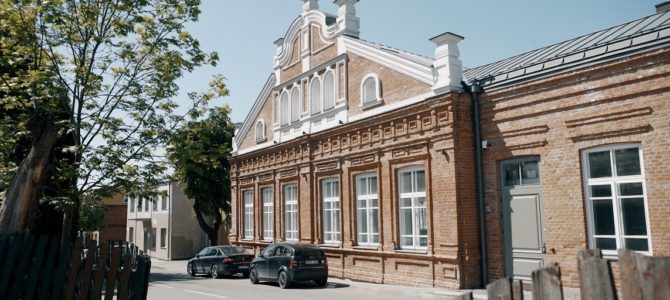Bernardinai.lt
Telšiai became an important economic and cultural center in the late 19th century. The large Jewish community which had lived there since ancient times had great influence on the growth and success of the city. Its members harmoniously merged with the city’s cultural, economic and political activity and were active participants in it.
In Telšiai as in other Lithuanian towns and cities Jews mainly engaged in mercantilism and traditional trades; there were also many Jewish doctors and dentists as well as Jews offering other services. Services and light industry were an important source of income for the Jews of Telšiai. For many others, however, the Jewish spiritual seminary–the yeshiva and its synagogues where hundreds of students from all over the world studied–became the way of making a living.
It wasn’t just the residents but the entire atmosphere of the community which demonstrated the spirit of the Jews of Telšiai. Here the ancient past the present lived alongside one another, proponents of tradition and of the Enlightenment, the orthodox and the secular and social activists. There were Torah sages and highly-educated people among the Jews of Telšiai. The city was filled with creative energy and spirituality and materiality merged into a perfect whole there. The crooked narrow streets and the old buildings were miraculous, a world filled with enchantment where thousands of Jewish families lived.

Purim, third grade of the preparatory section of the Telšiai yeshiva, 1938. Photograph from the collection of the Alka Museum of Žemaitija.
The majority of Jews who lived in Telšiai then held Orthodox views. Rising early before work they hurried to pray at synagogue and after a hard day’s work in the evening they also went to prayer services.
There were four synagogues in little Telšiai: the Great Synagogue, the Tailors Synagogue, the Soldiers Synagogue also known in Yiddish as the Yavoynishe kloyz, and the Butchers Synagogue. Today three of them still stand and adorn the city of Telšiai. Only the Great Synagogue was torn down in the Soviet era with a building in typical Soviet architecture replacing it.
The city of Telšiai didn’t just host Jewish houses of prayer. In different time-periods there were Jewish schools, kindergartens, Hebrew-language high schools and political and social welfare and aid organizations established here. In Telšiai there was a Jewish hospital, a Jewish library, a Jewish cafeteria for yeshiva students and a dormitory for those unable to rent a room in the city.
Full article in Lithuanian here.


